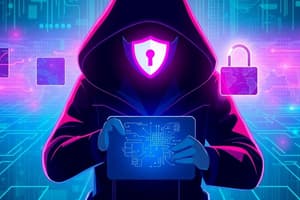Podcast
Questions and Answers
What is the primary purpose of ethical hacking?
What is the primary purpose of ethical hacking?
- To improve the security of networks or systems by fixing vulnerabilities (correct)
- To demonstrate hacking skills without any ethical considerations
- To identify and exploit vulnerabilities for personal gain
- To gain unauthorized access to systems for malicious purposes
Which of the following is NOT a rule for ethical hacking?
Which of the following is NOT a rule for ethical hacking?
- Leaving security vulnerabilities open for future exploitation (correct)
- Obtaining expressed permission before probing the network
- Respecting the individual's or company's privacy
- Notifying the software developer or hardware manufacturer of any vulnerabilities found
What is the primary goal of cyber security?
What is the primary goal of cyber security?
- To disrupt services provided by computer systems
- To misdirect computer systems' services for personal gain
- To prevent theft or damage to computer systems' hardware and software (correct)
- To identify and exploit vulnerabilities in computer systems
Which area of cyber security focuses on measures taken during software development?
Which area of cyber security focuses on measures taken during software development?
Which of the following is NOT a major technique used in Application Security?
Which of the following is NOT a major technique used in Application Security?
What does the term 'ethical hacking' imply?
What does the term 'ethical hacking' imply?
Which of the following is NOT a major area covered in cyber security?
Which of the following is NOT a major area covered in cyber security?
What is the purpose of cryptography in Application Security?
What is the purpose of cryptography in Application Security?
Which of the following is NOT a responsibility of an ethical hacker?
Which of the following is NOT a responsibility of an ethical hacker?
What is the primary objective of cyber security measures?
What is the primary objective of cyber security measures?
Flashcards are hidden until you start studying
Study Notes
Punishment and Fine
- Any person found guilty of punishable acts in Sections 4A and 4B of the Act shall be punished with imprisonment or a fine of at least PhP 200,000.00 up to a maximum amount commensurate to the damage incurred or both.
Cybersex
- Cybersex is a subcategory of online sexual activity where the internet is used for sexually gratifying activities.
- Individuals found guilty of cybersex face a jail term of 6 years and one day to 12 years or a fine of at least P200,000 but not exceeding P1 million.
Child Pornography
- Federal and state laws make it a crime to produce, distribute, or possess pornographic materials that portray a minor (someone under the age of 18).
- Punishment for child pornography via computer carries a penalty one degree higher than that provided by RA 9775, or the Anti-Child Pornography Act of 2009.
- Offenders may be fined from P50,000 to P5 million, and slapped with a maximum jail term of reclusion Perpetua, or 20 to 40 years.
Patent
- An invention involves an inventive step if it is not obvious to a person skilled in the art at the time of the filing date or priority date of the application claiming the invention.
- An invention that can be produced and used in any industry is considered industrially applicable.
- The term of a patent shall be twenty (20) years from the filing date of the application.
- The patent must be maintained yearly, starting from the 5th year.
Trademark
- A trademark is any special mark that differentiates goods and services of one entity from its competitors.
- Intellectual property examples of trademarks include slogans, logos, colors, or even sounds.
- Trademarks may protect designs, words, or other elements that are not considered copyrightable.
- The term of protection for a trademark is ten (10) years from the date of issuance and is renewable for a period of ten (10) years at a time.
Trade Secret
- A trade secret is a formula, process, device, or other business information that companies keep private to give a business advantage over competitors.
- Intellectual property examples of common trade secrets include manufacturing processes, client lists, ingredients, sales methods, launch strategies, and business plans.
- Trade secret protection is a complement to patent protection.
Intellectual Property Infringement
- Patent infringement means selling or using a patented invention without the permission of the patent owner.
- Trademark infringement occurs when someone uses a trademark that is confusingly similar to someone else's registered mark.
- Copyright infringement is when someone displays, produces, or distributes your work without your approval.
Identity Theft
- Identity theft is a crime in which an imposter obtains key pieces of personally identifiable information.
- Identity theft is defined when someone uses your personal information without your permission, to commit fraud or other crime.
- 5 most common types of identity theft: financial identity theft, criminal identity theft, medical identity theft, identity cloning, and business/commercial identity theft.
Ethical Hacking
- Ethical hacking aims to improve the security of the network or systems by fixing the vulnerabilities found during testing.
- Rules for ethical hacking: expressed permission, respect for individual privacy, closing out work, and reporting security vulnerabilities to software developers or hardware manufacturers.
Cyber Security
- Cyber security is the protection of computer systems from theft, damage, or disruption of services.
- Major areas covered in cyber security include application security, which encompasses measures taken during development to protect applications from threats.
- Techniques used in application security include identification, authentication & authorization of user, and cryptography.
Studying That Suits You
Use AI to generate personalized quizzes and flashcards to suit your learning preferences.




